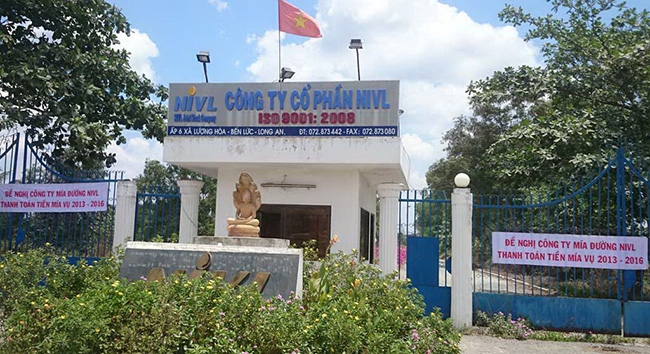Singaporean sugar factories up to the chin in debts
 |
Earlier this month, a group of nearly 25 sugar cane farmers and traders were reported to gather at the gate of NIVL JSC Company a subsidiary of Indo China Food Industry in the southern province of Long An to publicly demand payment for sugarcane sold earlier.
NIVL is known as the first foreign owned sugar factory to start production in
According to newswire Vietnamnet, NIVL owes a sum up to over VND80 billion ($3.67 million), which has not been settled since 2013.
Besides, this is the third time since June 2014 that local farmers and traders have had to come directly to the factory to urge payments in vain.
 |
The crowd was not settled until NIVL’s leaders (including production manager Nguyen Thanh San and financial manager Jalakam Sreenivassulu) pacified them with solutions to pay the sum as soon as possible. Accordingly, NIVL committed to pay in two instalments, the first due on May 16 and the second on June 30.
Suffering from NIVL’s late payments, farmer Le Van Luat said, “They still owe me nearly VND3.8 billion ($174,312),” destabilising his financial security. “I owe banks VND2.5 billion ($114,679) at 9 per cent interest rate per year and now I have to use payday loans to be able to pay the interest.”
Likewise, trader Nguyen Thi Thu Ha is equally worried, “I need the company to pay me the VND4 billion ($183,486) they owe.” Ha said that her financial imbalance got to the point when her lenders may foreclose her house at any time.
The local authorities said that they had been working with the company, holding several meetings and consultations, to protect farmers’ rights but have yet to solve the problem.
At the same time, another factory of the Singaporean company, Binh Dinh Sugar Factory (BISUCO), saw its commercial invoices invalidated for failing to pay its tax debt of VND13 billion ($596,330).
The debt sum is mainly attributable to land use fees and value-added tax arrears.
According to Binh Dinh authorities, BISUCO’s financial problems started in 2013, as was mirrored by late payments to farmers and the local tax authorities.
BISUCO’s financial difficulties are a result of heavy investments to rapidly expand the factories’ production capacity during the past few years, which put pressure on their capital management activities.
What the stars mean:
★ Poor ★ ★ Promising ★★★ Good ★★★★ Very good ★★★★★ Exceptional
Latest News
More News
- Businesses ramp up production as year-end orders surge (December 30, 2025 | 10:05)
- Vietjet chairwoman awarded Labour Hero title (December 29, 2025 | 13:06)
- How to unlock ESG value through green innovation (December 29, 2025 | 10:03)
- AI reshapes media and advertising industry (December 29, 2025 | 08:33)
- FPT and GELEX sign deal to develop blockchain tech for global markets (December 29, 2025 | 08:29)
- Vietnam’s GDP forecast to grow by 9 per cent in 2026 (December 29, 2025 | 08:29)
- Women entrepreneurs are key to Vietnam’s economic growth (December 29, 2025 | 08:00)
- Vietnam's top 500 value-creating enterprises announced (December 27, 2025 | 08:00)
- The PAN Group shaping a better future with ESG strategy (December 26, 2025 | 09:00)
- Masan Consumer officially lists on HSX, marking the next phase of value creation (December 25, 2025 | 13:20)

















 Mobile Version
Mobile Version